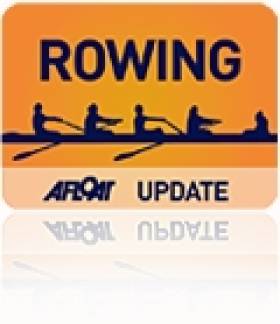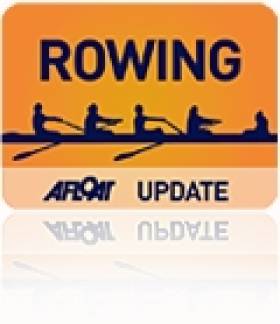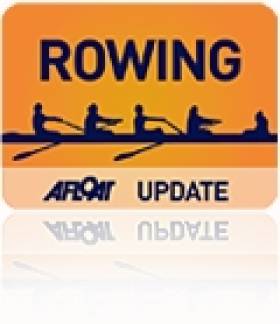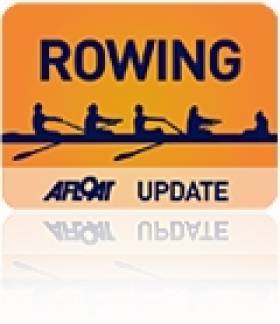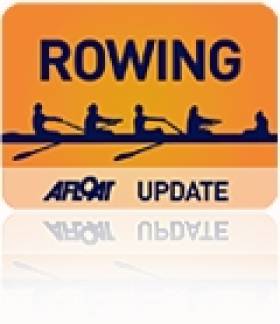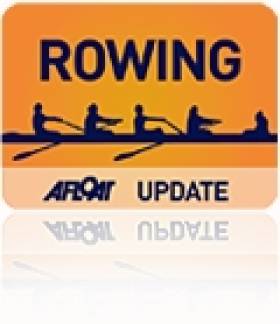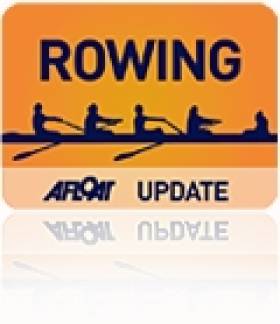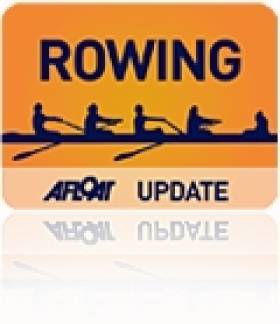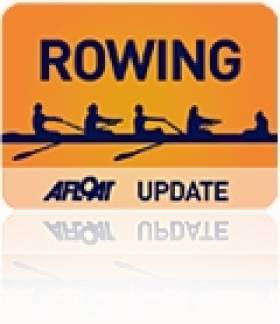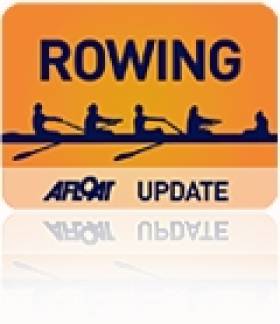Displaying items by tag: Rowing,
# ROWING: Ireland’s Claire Lambe had a bronze medal snatched from her in the final stages of the A Final of the lightweight single sculls at the World Under-23 Championships at Trakai in Lithuania this morning. Anna Ioannou of Cyprus came from fourth to pass the Dubliner in the final charge. Alena Kryvaseyenka of Belarus dominated the race, while Sweden's Emma Fred took silver.
Ireland had good results in the B Finals of two other women’s events. Holly Nixon and Laura D’Urso won their B Final (placing seventh overall) and Lisa Dilleen was second in the women’s single sculls B Final (eighth overall). The Galway woman made a great drive right at the finish and missed out on winning by .4 of a second.
World Under-23 Championships, Trakai, Lithuania (Irish interest)
Women
Double Scull - B Final (places 7-12): 1 Ireland (L D’Urso, H Nixon) 7:28.40, 2 Switzerland 7:33.73, 3 Germany 7:35.55, 4 United States 7:38.89, 5 Italy 7:43.72, 6 Romania 7:52.93.
Single Scull – B Final (places 7-12): 1 Hungary (K Gyimes) 8:07.40, 2 Ireland (L Dilleen) 8:07.74, 3 Bulgaria (L-M Rusinova) 8:13.74, 4 Netherlands 8:13.79, 5 Poland 8:15.57, 6 France 8:23.58.
Lightweight Single Scull – A Final: 1 Belarus (A Kryvasheyenka) 8:09.34, 2 Sweden (E Fred) 8:19.40, 3 Cyprus (A Ioannou) 8:22.85, 4 Ireland (C Lambe) 8:24.42, 5 Netherlands 8:28.67, 6 South Africa 8:33.66.
# ROWING: The second session of finals on the second day of the Irish Rowing Championships produced two cracking races. Galway Rowing Club won the women’s junior 18 eight final by overhauling Muckross stroke by stroke and then holding off their battling yellow-clad rivals until the line. The men’s senior quadruple sculls produced a surprise victory for the University of Limerick/Castleconnell crew after a similarly gutsy drive which saw them take on and beat Queen’s University.
The final four races were all won by big margins. Claire McIlwaine and Alex Greene gave Queen’s an immediate fillip when they won the women’s senior pair, and Brooke Edgar of Bann in the women’s novice single, Dave Neale of UCD in the intermediate single and Skibbereen in the men’s junior quadruple were all well in charge of their races.
Irish Rowing Championships, National Rowing Centre, Cork. Day Two (Selected Results)
Men
Eight – Intermediate: 1 Trinity 6:11.27, 2 NUIG 6:15.32, 3 UCD 6:15.42.
Four – Junior, coxed: 1 Portora 6:58.48, 2 Bann 7:02.24, 3 St Joseph’s A 7:02.36.
Pair – Senior: 1 Bann (C Black, J Cassells) 6:52.02, 2 Queen’s (P Gilanders, T Oliver) 6:57.09, 3 St Michael’s A (A McEvoy, M O’Brien) 6:59.86
Sculling, Quadruple – Senior: 1 University of Limerick/Castleconnell (L Rice, S Penny, A Sheehan, D Quinlan) 6:03.59, 2 Queen’s 6:04.28, 3 Carlow 6:04.99. Junior: 1 Skibbereen 6:15.17, 2 Shannon 6:26.55, 3 Cork 6:27.76.
Single – Intermediate: 1 UCD (D Neale) 7:12.01, 2 Portora (Monteith) 7:20.31, 3 Castleconnell (Pidgeon) 7:25.16. Novice: 1 Skibbereen (R O’Neill) 7:54.04, 2 Cappoquin (Landers), 3 Clonmel (Murphy) 7:54.39.
Women
Eight - Junior: 1 Galway RC 6:43.41, 2 Muckross 6:46.40, 3 St Michael’s 7:00.20.
Pair – Senior: 1 Queen’s (C McIwaine, A Greene) 7:29.70, 2 St Michael’s 7:40.64, 3 Cork 7:52.04.
Sculling
Double – Intermediate: 1 Skibbereen (L Connolly, E Cialis) 7:46.82, 2 NUIG 7:49.05, 3 Neptune 7:54.38.
Single – Novice: 1 Bann (Edgar) 8:19.22, 2 Commercial (Foley) 8:31.85, 3 Castleconnell (Donegan) 8:43.83. Junior: 1 Fermoy (H Shinnick) 8:12.60, 2 St Michael’s (K O’Brien) 8:14.64, 3 Portora (Cromie) 8:17.35.
# ROWING: Claire Lambe gave Ireland an A Finalist at the World Under-23 Championships in Lithuania today. The Dubliner finished second in her lightweight single scull semi final.
Ireland’s two other women’s crews will compete in B Finals tomorrow. The double scull of Laura D’Urso and Holly Nixon were edged out by Russia in their semi-final and finished fourth, while Lisa Dilleen finished fifth in the semi-final of the open weight single scull.
World Under-23 Championships, Trakai, Lithuania, Day Four (Irish interest)
Men
Four – B Final (Places 7-12): 1 Croatia 6:30.64, 2 Norway 6:34.03, 3 Canada 6:34.42, 4 Czech Republic 6:36.93, 5 Ireland (E Mullarkey, S O’Connor, F Manning, T Lynam) 6:43.49, 6 Ukraine 6:48.40.
Lightweight Pair – B Final (Places 7-12): 1 Argentina 7:39.53, 2 Belarus 7:43.85, 3 Ireland (S O’Driscoll, J Mitchell) 7:46.27.
Women
Double Scull - Semi-Final One (First Three to A Final; rest to B Final): 1 Austria 7:41.52, 2 Belarus 7:43.12, 3 Russia 7:48.57; 4 Ireland (L D’Urso, H Nixon) 7:51.91, 5 Germany 7:54.64, 6 Romania 8:09.87.
Single Scull - Semi-Final Two (First Three to A Final; rest to B Final): 1 Canada 8:37.30, 2 Britain 8:38.26, 3 Latvia 8:41.18; 4 Netherlands 8:42.82, 5 Ireland (L Dilleen) 9:06.17, 6 France 9: 20.29.
Lightweight Single Scull – Semi-Final One (First Three to A Final; rest to B Final): 1 Sweden (E Fred) 8:48.68, 2 Ireland (C Lambe) 8:54.91, 3 South Africa (K Johnstone) 8:57.92; 4 France 9:02.13, 5 Paraguay 9:09.78, 6 Germany 9:13.09.
Ireland Juniors Black and Cassells Win Senior Pairs Title at Irish Rowing Championships
# ROWING: The junior pair which will represent Ireland at the World Championships next month today won the senior pairs title at the Irish Rowing Championships. Bann’s Chris Black and Joel Cassells are an excellent crew and they showed it by taking a lead at the National Rowing Centre after 500 metres and never relinquishing it despite pressure from St Michael’s of Limerick.
Hilary Shinnick also held off St Michael’s, represented by Kate O’Brien, to win the junior single sculls’ title. Shinnick is just 17, but it was her second successive title. Shinnick will be part of a junior quadruple at the Worlds, while O'Brien will compete in a single scull.
The junior men’s coxed fours went to Portora of Enniskillen, while Skibbereen conitinued to notch up titles – Rory O’Neill took the novice single sculls crown, while Laura Connolly and Ella Cialis took the women’s intermediate double scull.
Trinity continued their good form with a win in the men’s intermediate eights.
Irish Rowing Championships, National Rowing Centre, Cork. Day Two, First Session (Selected Results)
Men,
Eight – Intermediate: 1 Trinity 6:11.27, 2 NUIG 6:15.32, 3 UCD 6:15.42.
Four – Junior, coxed: 1 Portora 6:58.48, 2 Bann 7:02.24, 3 St Joseph’s A 7:02.36.
Pair – Senior: 1 Bann (C Black, J Cassells) 6:52.02, 2 Queen’s (P Gilanders, T Oliver) 6:57.09, 3 St Michael’s A (A McEvoy, M O’Brien) 6:59.86
Sculling, Single – Novice: 1 Skibbereen (R O’Neill) 7:54.04, 2 Cappoquin (Landers), 3 Clonmel (Murphy) 7:54.39.
Women
Sculling, Double – Intermediate: 1 Skibbereen (L Connolly, E Cialis) 7:46.82, 2 NUIG 7:49.05, 3 Neptune 7:54.38.
Single – Junior: 1 Fermoy (H Shinnick) 8:12.60, 2 St Michael’s (K O’Brien) 8:14.64, 3 Portora (Cromie) 8:17.35.
#ROWING: Ireland’s Jonny Mitchell and Shane O’Driscoll finished third in the B Final of the lightweight pair at the World Under-23 Championships in Lithuania. This placed them ninth overall. Argentina, who disputed the lead with Switzerland in the first half of the race, took over in the second, as Switzerland faded. Belarus came through to take second.
The men’s four finished fifth in their B Final (11th overall) in a race won by Croatia. Norway, disputing fourth with Ireland until the final quarter, finished well and took second.
World Under-23 Championships, Trakai, Lithuania
Men
Four – B Final (Places 7-12): 1 Croatia 6:30.64, 2 Norway 6:34.03, 3 Canada 6:34.42, 4 Czech Republic 6:36.93, 5 Ireland (E Mullarkey, S O’Connor, F Manning, T Lynam) 6:43.49, 6 Ukraine 6:48.40.
Lightweight Pair – B Final (Places 7-12): 1 Argentina 7:39.53, 2 Belarus 7:43.85, 3 Ireland (S O’Driscoll, J Mitchell) 7:46.27.
Grainne Mhaol Take Fours Crown at Irish Rowing Championships
# ROWING: Grainne Mhaol had a surprisingly easy win the men’s senior four final at the Irish Championships at the National Rowing Centre in Cork. The crew of Dave Mannion, Alan Martin, Cormac Folan and James Wall led down the course. St Michael’s were second.
The junior men’s eight title also went to Galway, in the form of St Joseph’s, and the junior women’s four was won impressively by Muckross. Queen’s University took the men’s novice eight crown, and Three Castles had plenty to spare in the women’s senior double. Niall Kenny of UCC is the new Ireland champion in the lightweight single scull.
Irish Rowing Championships, Sponsored by SuperValu – Day One (Selected Results; Finals)
Men, Eight – Novice: 1 Queen’s University, Belfast 6:04.55, 2 UCD 6:10.94, 3 Trinity 6:16.26. Junior: 1 St Joseph’s College, Galway 6:03.87, 2 Methodist College, Belfast 6:10.72, 3 Galway RC 6:15.28.
Four – Senior: 1 Grainne Mhaol (D Mannion, A Martin, C Folan, James Wall) 6:19.06, 2 St Michael’s 6:22.35, 3 Queen’s 6:27.21.
Four, coxed – Intermediate: 1 Trinity 6:33.15, 2 NUIG A 6:33.74, 3 Bann 6:35.47.
Sculling, Quadruple – Novice, coxed: 1 Galway 6:55.56, 2 Shandon 6:58.56, 3 NUIG 7:57.82.
Double – Senior: 1 Queen’s (C Williamson, R O’Connor) 6:41.29, 2 Carlow 6:43.83, 3 University of Limerick 6:54.88.
Single – Lightweight: 1 UCC (Kenny) 7:20.40, 2 St Michael’s (O’Connor) 7:35.61, 3 Skibbereen (Burns) 7:35.73. Junior: 1 Skibbereen (P O’Donovan) 7:19.67, 2 Castleconnell (Quinlan), 3 Neptune (Griffin).
Women
Eight – Intermediate: 1 Trinity 6:44,80, 2 UCD 6:45.0, 3 St Michael’s 6:53.50.
Four - Senior: 1 Skibbereen (G Hosford, C Fitzgerald, D Walsh, S Dineen) 7:01.98, 2 Queen’s 7:11.86, 3 UCD 7:14.21. Junior: 1 Muckross 7:18.76, 2 Bann, 3 Galway.
Four, coxed – Novice: 1 NUIG 7:41.38, 2 Trinity 7:44.07, 3 University of Limerick 7:51.97.
Sculling, Double – Senior: 1 Three Castles (H Walshe, E Moran) 7:13.79, 2 Skibbereen 7:24.60. Junior: 1 Belfast BC (L Litvack, B Jacques) 7:36.55. 2 Neptune 7:50.63, 3 Carrick-on-Shannon 7:59.40.
# ROWING: Ireland’s two men’s crews at the World Under-23 Championships in Lithuania could not force their way into the top three in their semi-finals and will compete in B Finals tomorrow. The lightweight pair of Jonny Mitchell and Shane O’Donovan finished fourth in a fast race and the open weight four were fifth, off the pace in the second half of their semi-final.
World Under-23 Rowing Championships, Day Three (Irish interest)
Men
Four – Semi-Final One (First Three To A Final; rest to B Final): 1 Germany 6:07.72, 2 Australia 6:09.42, 3 United States 6:11.14; 4 Canada 6:15.15, 5 Ireland (E Mullarkey, S O’Connor, F Manning, T Lynam) 6:24.15, 6 Ukraine 6:25.91
Lightweight Pair – Semi-Final One (First Three To A Final; rest to B Final): 1 Italy 6:57.34, 2 Germany 7:00.08, 3 Hong Kong 7:00.45; 4 Ireland 7:13.55, 5 Lithuania 7:24.78, 6 United States 7:29.70.
Women
Lightweight Single Scull – Repechage Three (First Two to A/B Semi-Finals): 1 Ireland (C Lambe) 8:19.32, 2 Israel 8:23.22; 3 Czech Republic 8:28.19, 4 United States 8:35.35.
# ROWING: The first session of the Irish Rowing Championships, run in almost perfect conditions at the National Rowing Centre in Cork, finished with some terrific finals.
The closest race was the shootout between NUIG and Trinity in the men’s intermediate coxed four. NUIG had taken over the lead from Trinity and led as the crews charged for the line. But Trinity upped the rate and took the title on the line. Earlier, NUIG had reversed the order as they took the women’s novice coxed four, with Trinity second.
There were a string of impressive wins in senior and junior classes. At senior level the Skibbereen women’s four took their third successive title with ease, and the Queen’s double of Colin Williamson and Rory O’Connor matched the feat. The junior women’s double of Lucie Litvack and Bridget Jacques and single sculler Paul O’Donovan also demonstrated their skills with classy wins.
Irish Rowing Championships – Day One (Selected Results; Finals)
Men
Four, coxed – Intermediate: 1 Trinity 6:33.15, 2 NUIG A 6:33.74, 3 Bann 6:35.47.
Sculling, Double – Senior: 1 Queen’s (C Williamson, R O’Connor) 6:41.29, 2 Carlow 6:43.83, 3 University of Limerick 6:54.88.
Single – Junior: 1 Skibbereen (P O’Donovan) 7:19.67, 2 Castleconnell (Quinlan), 3 Neptune (Griffin).
Women
Four - Senior: 1 Skibbereen (G Hosford, C Fitzgerald, D Walsh, S Dineen) 7:01.98, 2 Queen’s 7:11.86, 3 UCD 7:14.21.
Four, coxed – Novice: 1 NUIG 7:41.38, 2 Trinity 7:44.07, 3 University of Limerick 7:51.97.
Sculling, Double – Junior: 1 Belfast BC (L Litvack, B Jacques) 7:36.55. 2 Neptune 7:50.63, 3 Carrick-on-Shannon 7:59.40.
# ROWING: Claire Lambe won her repechage at the World Under-23 Rowing Championships in Lithuania to become the fifth of the five Ireland crews to qualify for the A/B semi-finals. The Dubliner led down the course and had almost four seconds to spare over Chen Oshri of Israel, who also qualified.
World Under-23 Rowing Championships, Day Three (Irish interest)
Women
Lightweight Single Scull – Repechage Three (First Two to A/B Semi-Finals): 1 Ireland (C Lambe) 8:19.32, 2 Israel 8:23.22; 3 Czech Republic 8:28.19, 4 United States 8:35.35.
Ireland Under-23 Pair and Four Make World Rowing Semi-Finals
# ROWING: Two more Ireland boats moved into the semi-finals of the World Under-23 Rowing Championships in Trakai in Lithuania today. The lightweight pair of Jonny Mitchell and Shane O’Driscoll won their repechage by leading virtually all the way, while the men’s four came close to matching the feat, finishing second. They won a battle with Norway but were pipped by Ukraine, who mounted a surprise late charge, having been in third for much of the 2,000 metres. All three crews qualified.
World Under-23 Championships, Trakai, Lithuania, Day Two (Irish interest)
Men
Four – Repechage (First Three to A/B Semi-Final): 1 Ukraine 6:12.88, 2 Ireland (E Mullarkey, S O’Connor, F Manning, T Lynam) 6:16.64, 3 Norway 6:18.89; 4 Lithuania 6:24.74.
Lightweight Pair – Repechage (First Three to A/B Semi-Final): Ireland (S O’Driscoll, J Mitchell) 6:51.24, 2 Switzerland 6:51.89, 3 Lithuania 6:55.97; 4 Croatia 7:03.13
Women
Double Scull – Heat Three (First Three directly to A/B Semi-Final; rest to repechage): 1 Austria (M Lobnig, L Farthofer) 7:24.99, 2 France 7:29.62, Ireland (L D’Urso, H Nixon) 7:31.90; 4 Romania 7:42.91, 5 Croatia 7:47.31
Single Scull – Heat One (First Two Directly to A/B Semi-Final; rest to repechage): 1 Denmark (R Quist) 7:49.16, 2 Ireland (L Dilleen) 7:54.72; 3 United States 7:59.12, 4 Belgium 8:05.15, 5 France 8:08.88.
Lightweight Single Scull – Heat One (First directly to A/B Semi-Final, rest to repechage): 1 Cyprus (A Ioannou) 8:07.34, 2 Ireland (C Lambe) 8:12.84.



























